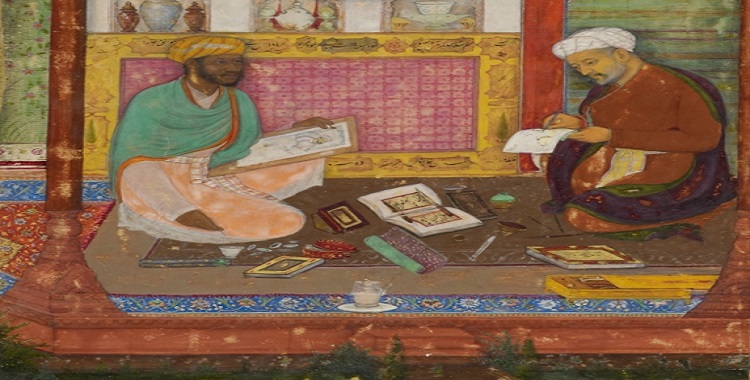سەردەفتەرێ وەصفێن تەیە دیباجەیێ دل
یەک قەطرە ژ لوطفا تەیە سیراجەیێ دل
ذکرێ تە دکت دوڕ و ضیا لەهجەیێ دل
طەیرێ نەفەسا های و هوویا لەهجەیێ دل
A précis of your beauty is the preface to my heart.
A droplet of your grace ignites the lantern of my heart.
You are, O glistening pearl, an endless chanting in the language of my heart.
O bird of my breath, you are the ever whispered sigh within my heart.
قەوسێ تە هلالی ب دەلالی کەشها
بەژنا تە ژ شەنگی ب دەرەنگی مەشها
مارێ ژ حەریرێ د عەبیرێ خوەشها
ماوەر بوو ژ وان زولفێ د زەنگێ وەشها
That arc, the crescent of your brows, has coyly limned the new moon’s glow.
Your lofty body, laden with allure, moves stately, slow.
A dusky serpent hisses midst the silk and amber, to and fro:
rosewater from those darkly coiled tresses flows.
ئاخا قەدەما موحتەرەما سیمبەریمە
وەک سایە پەیاپەی ل ڕێ یا نەی شەککەریمە
هەر کەفتمە ڕێ ڕەهـ ژ گرێ (رهگذر)یمە
دائم د سولووکا خوە رجووکارێ ئەویمە
I am but the dust cast from a gracious silver shape,
a shadow ever cast along the paths of sugarcane,
and ever hopeful fall whereon my love might pace.
As mottled dust below I wait to raise my loving praise.
بورهێن تە ب هەڤڕانە سەرێ دەعوائێ
سونبول ژ طەرەف هاتینە سەر غەوغائێ
دا هەر ژ دل ڕیش بکن یەغمائێ
فەریاد ژ دەستێ تە شیرین شەهلائێ
Your brow, Beloved, is the source of all competing claims.
The hyacinth your ringlets form contends in twain
to plunder bare the wounded heart’s remains.
Sweet, darkly dreaming ember eye, my sighs are your domain.
***
Translators’ Note: Sheikh Ahmad, known as Malaye Jaziri or “Mala” as he signed his works (d. 1640 CE), was the most important Kurdish poet of the sixteenth and seventeenth centuries, and his poetic oeuvre, or diwan, is one of the most significant works in all of Kurdish literature. These four poems from his diwan represent the fundamental genesis of modern Kurdish poetry, because Mala was the first to deploy Classical Perso-Arabic forms in Kurdish verse. He pioneered the rubai in Kurdish. Our English translations approximate the Kurdish rhymes with English assonance and half-rhymes, which, in English-language poetry, achieve a less heavy-handed, more palatable effect. We also endeavored to balance the feminine and masculine traits of the addressee, never explicitly indicating whether the Beloved is male or female, to preserve Mala’s deliberate ambiguity on this point. In keeping with this indeterminacy, the rubai invites supple interpretations, capable of adapting the poem’s sequence of surprising imagery to apply to a human lover, a deity, a homeland. Like other Persian, Indo-Persian, Arab, and Turkish poets, Mala worked within a highly regulated set of poetic conventions but the poetic strictures did not constrain the range of his vast sources of inspiration. He began writing poetry at age twelve, and drew on voices from regions stretching from the Iranian plateau to the Turkish steppe, from the back alleys of Konya to the bazaars of Delhi, casting into sharp relief the interpenetration of apparent opposites — metaphysical and material, transcendent and quotidian, death and desire, sacred and profane, the ephemeral and the eternal. Within the rubai’s formal parameters, he crafted a poetics that blend Sufi Islam with non-Muslim traditions of Kurdistan more widely (Christian, Jewish, Zoroastrian, and Yezidi, among others). This sampling showcases the geographical and thematic range on which Mala drew while introducing a Kurdish voice that stands comparison with leading Sufi poets across the ages. Although Mala wrote in the seventeenth century, his imagery remains strikingly innovative today and, for its transcendent treatment of human worth and beauty, wields a compelling relevance at a time when geopolitical attention is again trained upon the Kurdish regions of Iraq, Iran, Syria, and Turkey.
***
Translators’ bios: Haidar Khezri is the University of Central Florida’s first Assistant Professor of Arabic. He has published translations out of and into Kurdish, Persian, Arabic, and English.
Tyler Fisher is Associate Professor of Modern Languages and Literatures at the University of Central Florida. He has published English translations of poetry from Spanish, Catalan, Aramaic, and Sorani Kurdish.
***
Colophon portrait from the 1595-6 Khamsa of Nizami, signed by Daulat.





